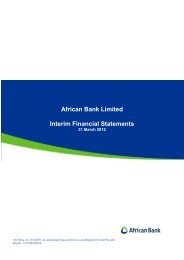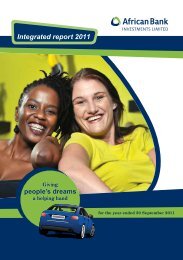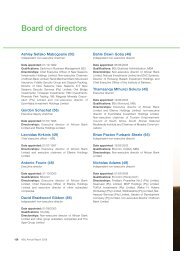Download - African Bank
Download - African Bank
Download - African Bank
You also want an ePaper? Increase the reach of your titles
YUMPU automatically turns print PDFs into web optimized ePapers that Google loves.
The progress<br />
The corporate social<br />
citizenship management<br />
rating (CCMR)<br />
As the first step in the assessment of its<br />
sustainability model, ABIL commissioned<br />
<strong>African</strong> Institute of Corporate Citizenship<br />
(AICC) to conduct a study of its current<br />
sustainability practices. The analysis<br />
focused on the management of<br />
corporate citizenship as opposed to<br />
output-based measures of social or<br />
environmental impact. It considered<br />
international best practices and<br />
addressed the transformational issues in<br />
a South <strong>African</strong> context. The analysis has<br />
four dimensions which are applied across<br />
15 elements of corporate citizenship. The<br />
dimensions consider:<br />
Practices – Current corporate<br />
citizenship activities within the<br />
company<br />
Formalisation – The extent to which<br />
those practices have been formalised<br />
Embedding – The way those<br />
practices are being embedded<br />
across the organisation<br />
Integration – The way all elements<br />
of corporate citizenship are<br />
integrated under one banner.<br />
Elements identified as being relevant to<br />
corporate citizenship cover a wide<br />
spectrum of corporate activities,<br />
including company governance, control<br />
and management, workplace and<br />
employment practices, operational<br />
practices, the supply chain, the market<br />
and the external environment (including<br />
both social and environmental issues).<br />
More specifically, 15 elements were<br />
identified as relevant, and research<br />
(interviews with senior management) was<br />
conducted for each of these corporate<br />
citizenship elements.<br />
Labour/employee relations<br />
Human resource and skills<br />
development<br />
Developmental procurement<br />
Supply chain compliance<br />
Safety and health<br />
Physical environment<br />
Social impact of operations<br />
HIV/Aids<br />
Product stewardship and brand ethics<br />
Corporate governance<br />
Employment equity<br />
Black ownership and control<br />
Corporate social investment<br />
Human rights<br />
Leadership in corporate citizenship<br />
The analysis looked at what activities are<br />
carried out, and how these are<br />
implemented within the group. The<br />
focus is on inputs required to achieve<br />
social and environmental responsibility,<br />
rather than on actual social and<br />
environmental impact, or perceptions.<br />
The composite rating for each corporate<br />
citizenship element and dimension<br />
enables a footprint of corporate<br />
citizenship management performance for<br />
the company. This footprint can be used<br />
in a number of ways:<br />
– Areas of underperformance can<br />
be identified, per element or<br />
by comparison between each<br />
dimension. An action plan can<br />
be developed to address areas<br />
of acknowledged weakness.<br />
– The performance of the<br />
company can be tracked over<br />
time. By updating the ratings in<br />
a year or two, the company can<br />
identify and highlight areas of<br />
improvement.<br />
– The overall rating of the<br />
company can be used to<br />
demonstrate responsible<br />
corporate citizenship behaviour<br />
and planning, both internally<br />
and externally.<br />
– Once the overall sample is<br />
sufficiently large, the company<br />
can benchmark its own scores<br />
against an aggregated total of<br />
other large South <strong>African</strong><br />
companies.<br />
The framework will enable the group<br />
to assess its current performance, to<br />
develop a plan of improvement and<br />
implementation of management<br />
systems, to set out reporting schedules<br />
and objectives, and to begin the process<br />
of ingraining corporate citizenship as a<br />
way of doing business.<br />
Extract from the<br />
corporate citizenship<br />
management rating<br />
survey<br />
“Good practices, fairly well<br />
embedded<br />
<strong>African</strong> <strong>Bank</strong> fares adequately against<br />
the CCMR. However, there is scope for<br />
improvement in certain areas.<br />
In terms of the four dimensions referred<br />
to above, <strong>African</strong> <strong>Bank</strong> performs best on<br />
practices and embedment, indicating<br />
that it is making a concerted effort, in<br />
most areas, to progress its corporate<br />
citizenship practices.<br />
<strong>African</strong> <strong>Bank</strong> scores highly in terms of<br />
the extent to which certain elements<br />
have been formalised, but poorly in<br />
other areas.”<br />
“Integrated management<br />
lacking in many areas<br />
As with most organisations using the<br />
CCMR model, <strong>African</strong> <strong>Bank</strong> fares less<br />
well when considering all 15 elements as<br />
an integrated approach to being a good<br />
corporate citizen. Although <strong>African</strong> <strong>Bank</strong><br />
displays strong leadership in the<br />
adoption of corporate citizenship as a<br />
business philosophy, responsibility for<br />
formalising and co-ordinating citizenship<br />
activities is not yet sufficiently centralised<br />
within the organisation. The lower<br />
integration score therefore implies that<br />
better synergies could be established<br />
between the different elements of<br />
corporate citizenship.<br />
It is evident that <strong>African</strong> <strong>Bank</strong> is<br />
cognisant of its responsibility to be a<br />
good corporate citizen and is making a<br />
concerted effort to further its status.<br />
It was clear from the interviews that there<br />
is a desire to formalise many of the<br />
elements, establishing policies, setting<br />
targets and guidelines, reviewing<br />
progress and embedding an<br />
understanding through awareness<br />
programmes and training among staff.<br />
Such a process should result in a more<br />
holistic management and reporting of<br />
corporate citizenship within <strong>African</strong><br />
<strong>Bank</strong>.”<br />
73<br />
<strong>African</strong> <strong>Bank</strong> Investments Limited







